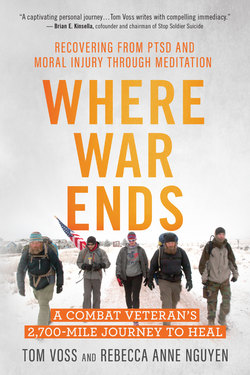Читать книгу Where War Ends - Tom Voss - Страница 17
На сайте Литреса книга снята с продажи.
Оглавление5
RULES OF ENGAGEMENT
When the dump truck starts speeding up to the tail end of your convoy, you’ll ignore the fear that rises in your throat. You’ll repress the memory of the last dump truck you saw — the one that had a five-hundred-pound bomb in the back of the cab. You’ll resist the urge to take out the driver immediately so he doesn’t take you out first. You’ll instead follow the rules of engagement (ROE). These rules will help you make decisions about whether to use force or engage the enemy. They’ll offer a framework for making moral calls that would otherwise be impossible to make.
Because you’ll be following the ROE, you’ll fire a warning shot into the air. And when the driver doesn’t stop, you won’t panic. You won’t think. Because you’ll no longer be you, and the old rules of the old you will no longer apply. Three shots to the tires, and the truck will still rumble down the road. Two shots to the engine block. The truck will not stop. By that point, you will have followed every rule. By that point you’ll be ready to engage the windshield to take out the driver. Then you will do just that. Then the truck will veer to the side of the road, hop a curb, and grind to a rolling stop.
And when you’re first on the scene, and both doors are locked, you’ll smash the passenger-side window and find the driver slumped over the steering wheel. You’ll see that he’s been shot three times — twice in the chest and once through the hand. You’ll watch the medics struggle to get an IV in because the driver’s veins have collapsed. You’ll realize that one of the warning shots to the truck traveled through the engine compartment, blew through the driver’s palm, and exploded out the back of his hand. He couldn’t have shifted gears to stop the vehicle if he’d wanted to. You’ll realize there are no weapons, no explosive devices, absolutely nothing in his truck. Later you’ll think he probably wanted to stop but couldn’t. Or maybe he wanted to die. Or maybe his truck was just too loud, and he couldn’t hear your warning shots in the first place.
“Why the fuck didn’t you stop?” you’ll ask the man.
You’ll watch as he’s pulled out of the truck and onto the ground, gasping for air — survival breathing. You’ll help try to seal his chest wounds.
You’ll try to save his life. You’ll watch your sergeant, SFC Long, saunter up to the truck.
You’ll hear SFC Long sigh impatiently.
“Are we done here?” he’ll say.
You’ll park your vehicle a block away from the hospital, beyond the cement barricades that have been installed to prevent car bombs. You’ll run behind the dying man as he’s carried toward the hospital on a stretcher. His body will bounce up and down as you race past hundreds of civilians waiting in line for medical treatment. It will feel like you’re in a parade no one wanted to come to.
All eyes will be on you. All eyes will shift, in unison, to your victim. All eyes will shift back to you, and you’ll see that quiet flicker of restraint flash across each cornea: you’ll see the human spirit reining in its own rage.
Suddenly, one of the guys carrying the stretcher will trip on a pothole in the road. Your buddy Ethan will trip and fall alongside him. The man will topple off the stretcher and onto the pavement in front of the huge crowd. His head will sound like a football helmet hitting the ground.
A hospital attendant will meet you at the entrance with a wheelchair for a man who will never again be able to sit up.
You will have followed the ROE. You will have followed orders. You will have followed protocol. You will have done nothing wrong. You will not think about the man in the truck until much later, when the war is no longer all around you but inside you, playing itself out over and over again. What will stay with you and haunt you won’t be the man on the stretcher so much as the way your sergeant sauntered up to the truck and asked, “Are we done here?”
And those four words, with their cool, inhuman indifference, will wound you more deeply than the shots you fired that day ever could.
But you won’t be able to think about that while you’re still there. The man who drove the dump truck will die. You’ll still be alive. And if you do as you’re told — if you surrender yourself to the group until there’s no telling where your boots end and someone else’s begin, with no telling where your soul ends and another begins, no telling if you even had a soul to begin with — maybe you’ll stay that way.
